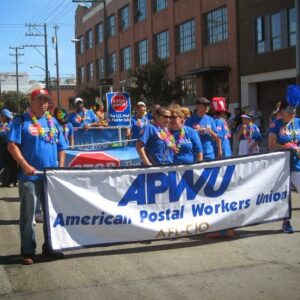April 28, 2011
Don’t Let Anti-Labor Politicians Stop You From Voting
Some very powerful politicians have set their sights on postal employees, APWU President Cliff Guffey has warned, and union members must respond decisively.
“Anti-labor members of Congress have said the union’s tentative Collective Bargaining Agreement is too favorable to workers,” the union president noted. “They favor contracting out virtually all of our jobs.
“I have a simple response,” he said. “I encourage every APWU member to get actively involved in union affairs — and to start by voting on ratification of the tentative Collective Bargaining Agreement. We also must get much more involved in the legislative arena.
“Don’t let these naysayers discourage you from voting.”
At an April 5 hearing of the House Oversight and Government Reform Committee, Chairman Darrell Issa (R-CA) and other Republicans repeatedly criticized Postmaster General Patrick Donahoe and members of the USPS Board of Governors for agreeing to the union’s demand during negotiations to retain protection against layoffs. They also said the Postal Service needed more freedom to close postal facilities and cut the workforce.
“This is an attack on our collective bargaining rights,” Guffey said. “The APWU and the Postal Service reached an agreement that would benefit both sides — and now anti-union legislators are attempting to undermine it.”
More Attacks
Influential lawmakers are also proposing legislation that would weaken postal unions by changing our bargaining process, Guffey pointed out. A bill sponsored by Sen. Susan Collins (R-ME) to ease the USPS financial crisis also would require arbitrators to “consider the financial health” of the USPS when contract negotiations reach an impasse. Although the bill (S.353) has some beneficial provisions, it would give management an unfair advantage in bargaining.
“With governors and state legislatures across the country chipping away at the rights of teachers, nurses, and firefighters to engage in collective bargaining, this issue should not be taken lightly,” Guffey cautioned.
In addition, on March 28, Sen. John McCain (R-AZ) introduced an amendment to S. 493, a bill to reauthorize small-business programs, that would dramatically increase the cost of health and life insurance premiums for postal employees, and that would void provisions of the Tentative Agreement. The amendment would set postal contributions to health and life insurance coverage at the same rate other federal employees pay, increasing postal workers’ contributions substantially.
In addition to McCain’s amendment, Sens. Tom Coburn (R-OK) and Richard Burr (R-NC) introduced a bill that would deny federal workers hired after 2012 the right to participate in the Federal Employees Retirement System (FERS). If approved, S. 644 would end the defined benefits portion of the FERS program and leave in place only the Thrift Savings Plan (TSP). It also would reduce the employers’ pension contributions, and force employees to pay more toward their retirement benefits.
Good News
Fortunately, pro-worker lawmakers also have introduced legislation to help solve the Postal Service’s financial problems, Guffey said. Rep. Stephen Lynch (D-MA) has submitted H.R. 1351, which would correct the methodology used by the Office of Personnel Management (OPM) for computing the Postal Service’s pension liabilities. An improper funding formula has led to USPS overpayments into the Civil Service Retirement System (CSRS) of more than $50 billion and overpayments into the Federal Employees Retirement System (FERS) of approximately $7 billion.
“I urge APWU members to contact their U.S. representatives and ask them to co-sponsor this important bill,” Guffey said.
“APWU members cannot afford to sit back and watch while others determine our future,” Guffey said. “Every member must get involved.”


